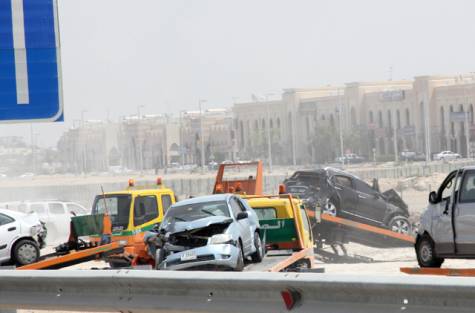 Dubai, Jan 27: The National Centre of Meteorology and Seismology (NCMS) has called on the motorists to be cautious on roads due to low horizontal visibility in Abu Dhabi.
Dubai, Jan 27: The National Centre of Meteorology and Seismology (NCMS) has called on the motorists to be cautious on roads due to low horizontal visibility in Abu Dhabi.
Dubai Police also tweeted: "We call on all drivers to be cautious and to drive safely and leave enough distance between vehicles due to heavy fog and unclear vision."
The NCMS said in a statement that: "As a result of the movement of low clouds adjacent to the coast of Abu Dhabi with the onset of the sea breeze at noon, the clouds veered towards Abu Dhabi city.”
It pointed out that with the presence of high pressure in the upper layers of the atmosphere, the base of the clouds decreased to become so close to the surface of the earth, hence reducing the horizontal visibility in Abu Dhabi.
A series of accidents over the weekend, all fog related, have raised the fog-level warnings to serious.
One driver was seriously injured, while 17 others sustained medium to minor injuries in three pile-ups on the Abu Dhabi-Dubai highway on Friday.
The accidents took place at different locations on both sides of the highway. Fifty vehicles were damaged, two of them burned completely on the spot.
The preliminary investigations showed that the accidents occurred as a result of fog, poor visibility, and the drivers' failure to abide by the traffic rules.
The Traffic and Patrols Directorate at Abu Dhabi Police urged the motorists to exercise caution, pay attention, reduce speed and leave enough safe distance among vehicles during variable weather conditions.
Lt Colonel Mohammed Ahmed Al Mazrouei, Acting Head of the Peripheral Regions Traffic Department at the Traffic and Patrols Directorate in Abu Dhabi Police, noted that as soon as the report was received, the directorate initiated the emergency plan for fog-related incidents, in coordination with Civil Defence and the Emergency and Public Safety Department.
He added that the collisions occurred between 7am and 7.30am at three separate locations on both sides of the highway as a result of heavy fog, speed, and failure to leave enough space among the vehicles.
The second accident took place in the area just before Sih Sameeh area outbound from Abu Dhabi; 11 people sustained minor to moderate injuries and 12 vehicles were damaged.
The third accident occurred just before Al Tawila Bridge outbound from Abu Dhabi; five people sustained minor to moderate injuries and 30 vehicles were damaged," explained Lt Colonel Al Mazroui.
As a part of the 'Safety During Fog' initiative, which is organised by the directorate in cooperation with the Security Media Department at the General Secretariat of the Office of Deputy Prime Minister and Minister of Interior, Al Mazrouei urged all drivers, especially the truck drivers, to reduce speed, refrain from overtaking, and avoid using warning hazard lights.
He noted that the measures adopted by the directorate during foggy conditions, particularly preventing trucks and large vehicles from using roads during fog, until the fog clears and visibility is good.
"Severe penalties will be implemented on those who fail to abide by these rules, which aim to promote traffic safety during foggy conditions and reduce traffic accidents," he said.
"Motorists are advised to follow the traffic instructions during foggy conditions, notably by leaving enough space among vehicles, reducing speed, avoiding overtaking, using low lights, avoiding hazard lights, and listening to awareness messages provided by the Abu Dhabi Police to motorists through the media," Al Mazrouei said.





Comments
Add new comment